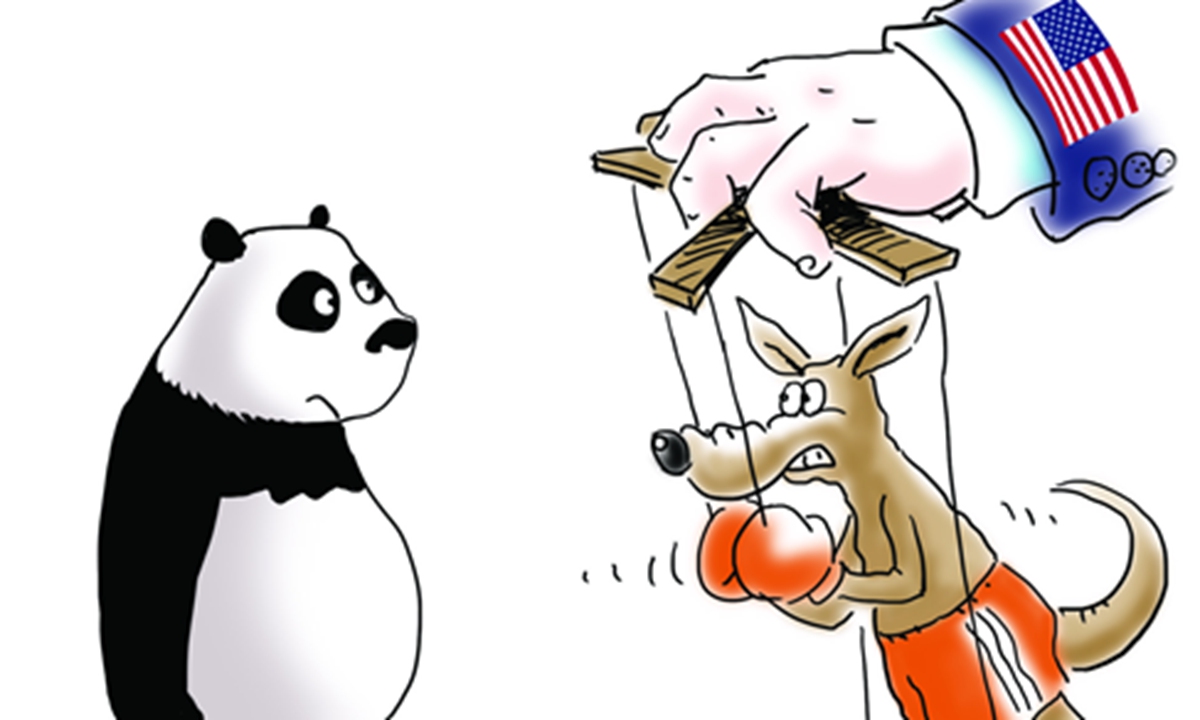
Illustration: Liu Rui/GT
A day after the
Ronald Reagan Carrier Strike Group of the US Navy entered the South China Sea, ABC News on Thursday cited military observers that the tempo of Australian Defense Force activity in the South China Sea is high. And "there is a pattern associated with Australia's activities now [that is] very much aligned with the way in which the United States conducts similar activities." The report said that "Concerns are growing that a serious incident could soon occur between the ADF and the Chinese military."
"Australia's new government obviously hopes to continue to support, cooperate with, and follow the US in increasing its provocative military activities in the South China Sea, and challenge China's legitimate claims on the islands and reefs in the region," Xu Shanpin, an adjunct research fellow at the China University of Mining and Technology, told Global Times, "It is worth noting that Australia will not only continue to ramp up its political and diplomatic involvement in the South China Sea, but also increase its military involvement there."
USNI News on Tuesday reported that Richard Marles, Australia's deputy prime minister and defense minister, said that Australia is developing long-range strike weapons, remains intent on building a nuclear powered submarine force and is ramping up its area access denial capabilities in cooperation with the US as it watches China "trying to shape the world around us."
"This once again demonstrates that the Albanese government's China policy is not fundamentally different to that of the Morrison government, especially in terms of coordinating with the US' strategy in containing China. It is anticipated that Australia will continue to pursue a reckless China policy, particularly in conjunction with the US' Indo-Pacific Strategy to contain China," according to Song Zhongping, a Chinese military expert and TV commentator.
Australia's defense and foreign policies lack of independence and autonomy, they only follow the US' lead and, playing a supporting role. In this context, whoever is elected as the head of the Australian government cannot escape the restraint of the US, or the influence of domestic populist trends. "Today, Australia's right-wing is rampant within Australian society, triggering a grave populist trend across the entire population, especially in terms of anti-China sentiment, which echoes the US," said Song. Australia's policy under both the Morrison and Albanese governments is actually to implement the global hegemonic strategy of the US and maintain the US-led global order.
In terms of the difference between Wong and Marles when talking about China, Xu said it does not indicate that there are fundamental divergences between the two ministers in their China policies. The Australian Department of Foreign Affairs and Trade is in competition with the Ministry of Defense for discourse power and political status within their Party. As a result, there are some differences in their rhetoric toward China. Yet this does not mean a major difference between the two departments on how to deal with China.
According to Song, the Australian foreign and defense ministries are play the roles of good cop, bad cop. Wong's seemingly mild remarks are out of the importance she attaches to the Chinese market. China is Australia's largest market. Her predecessor's lost share in the Chinese market has caused extensive damage to Australia's exports.
If Australia genuinely wants to ease its ties with China, it must change its course and discard coordinating with the US' anti-China strategy. This will be difficult for Australia. During the Morrison government, China-Australia relations sank to a record low. In regard to whether bilateral ties can be reset is now in Australia's court. But judging from its recent response, Australia's new government wants to reap benefit from Chinese market while seeking to contain it at the same time. This is daydreaming, the Chinese expert said.




